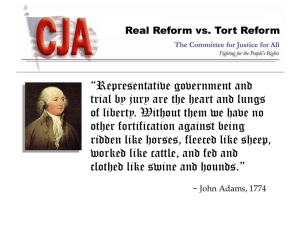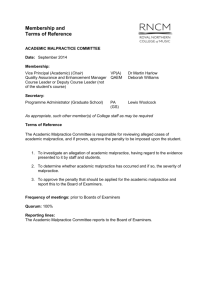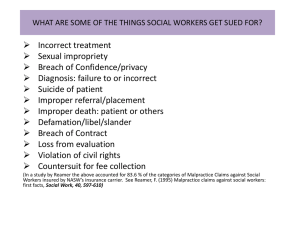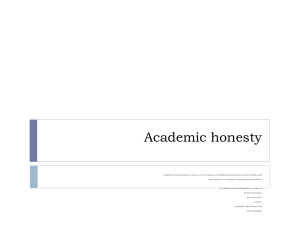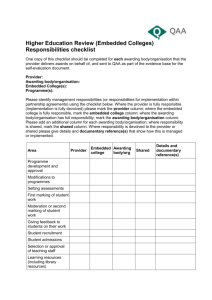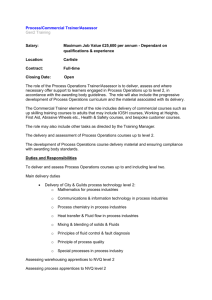Policy on Assessment Malpractice
advertisement
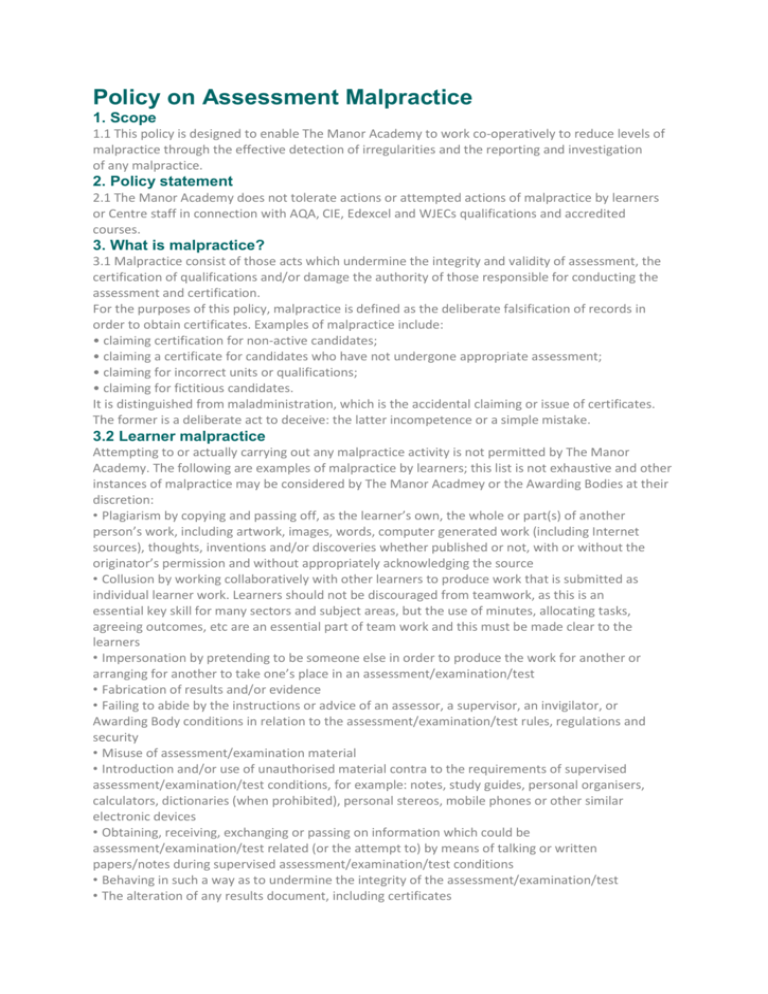
Policy on Assessment Malpractice 1. Scope 1.1 This policy is designed to enable The Manor Academy to work co‐operatively to reduce levels of malpractice through the effective detection of irregularities and the reporting and investigation of any malpractice. 2. Policy statement 2.1 The Manor Academy does not tolerate actions or attempted actions of malpractice by learners or Centre staff in connection with AQA, CIE, Edexcel and WJECs qualifications and accredited courses. 3. What is malpractice? 3.1 Malpractice consist of those acts which undermine the integrity and validity of assessment, the certification of qualifications and/or damage the authority of those responsible for conducting the assessment and certification. For the purposes of this policy, malpractice is defined as the deliberate falsification of records in order to obtain certificates. Examples of malpractice include: • claiming certification for non‐active candidates; • claiming a certificate for candidates who have not undergone appropriate assessment; • claiming for incorrect units or qualifications; • claiming for fictitious candidates. It is distinguished from maladministration, which is the accidental claiming or issue of certificates. The former is a deliberate act to deceive: the latter incompetence or a simple mistake. 3.2 Learner malpractice Attempting to or actually carrying out any malpractice activity is not permitted by The Manor Academy. The following are examples of malpractice by learners; this list is not exhaustive and other instances of malpractice may be considered by The Manor Acadmey or the Awarding Bodies at their discretion: • Plagiarism by copying and passing off, as the learner’s own, the whole or part(s) of another person’s work, including artwork, images, words, computer generated work (including Internet sources), thoughts, inventions and/or discoveries whether published or not, with or without the originator’s permission and without appropriately acknowledging the source • Collusion by working collaboratively with other learners to produce work that is submitted as individual learner work. Learners should not be discouraged from teamwork, as this is an essential key skill for many sectors and subject areas, but the use of minutes, allocating tasks, agreeing outcomes, etc are an essential part of team work and this must be made clear to the learners • Impersonation by pretending to be someone else in order to produce the work for another or arranging for another to take one’s place in an assessment/examination/test • Fabrication of results and/or evidence • Failing to abide by the instructions or advice of an assessor, a supervisor, an invigilator, or Awarding Body conditions in relation to the assessment/examination/test rules, regulations and security • Misuse of assessment/examination material • Introduction and/or use of unauthorised material contra to the requirements of supervised assessment/examination/test conditions, for example: notes, study guides, personal organisers, calculators, dictionaries (when prohibited), personal stereos, mobile phones or other similar electronic devices • Obtaining, receiving, exchanging or passing on information which could be assessment/examination/test related (or the attempt to) by means of talking or written papers/notes during supervised assessment/examination/test conditions • Behaving in such a way as to undermine the integrity of the assessment/examination/test • The alteration of any results document, including certificates cheating to gain an unfair advantage. 3.3 Centre staff malpractice The following are examples of malpractice by Centre staff. The list is not exhaustive and other instances of malpractice may be considered by The Manor Academy or the Awarding Bodies at their discretion: • Failing to keep any Awarding Body mark schemes secure • Alteration of any Awarding Body mark schemes • Alteration of Awarding Body assessment and grading criteria • Assisting learners in the production of work for assessment, where the support has the potential to influence the outcomes of assessment, for example where the assistance involves Centre staff producing work for the learner • Producing falsified witness statements, for example for evidence the learner has not generated • Allowing evidence, which is known by the staff member not to be the learner’s own, to be included in a learner’s assignment/task/portfolio/ coursework facilitating and allowing impersonation • Misusing the conditions for special learner requirements, for example where learners are permitted support, such as an amanuensis, this is permissible up to the point where the support has the potential to influence the outcome of the assessment • Failing to keep learner computer files secure • Falsifying records/certificates, for example by alteration, substitution, or by fraud • Fraudulent certificate claims, that is claiming for a certificate prior to the learner completing all the requirements of assessment • Failing to keep assessment/examination/test papers secure prior to the assessment/examination/test • Obtaining unauthorised access to assessment/examination/test material prior to an assessment/examination/test. 4. Prevention of or minimising malpractice 4.1 The Manor Academy will take steps to prevent or reduce the occurrences of learner malpractice. These steps will include: • Learners will undergo an induction which will inform learners of the centre’s policy on malpractice and the penalties for attempted and actual incidents of malpractice and they will be provided with a copy of the policy in the learner handbook. • Showing learners the appropriate formats to record cited texts and other materials or information sources including websites. Learners should not be discouraged from conducting research; indeed evidence of relevant research often contributes to the achievement of higher grades. However, the submitted work must show evidence that the learner has interpreted and synthesised appropriate information and has acknowledged any sources used. • Introducing procedures for assessing work in a way that reduces or identifies malpractice, e.g. plagiarism, collusion, cheating, etc. These procedures may include: o Periods of supervised sessions during which evidence for assignments/tasks/coursework is produced by the learner o Altering assessment assignments/tasks/tools on a regular basis o The assessor assessing work for a single assignment/task in a single session for the complete cohort of learners o Using oral questions with learners to ascertain their understanding of the concepts, application, etc within their work Assessors getting to know their learners’ styles and abilities, etc • Ensuring access controls are installed to prevent learners from accessing and using other people’s work when using networked computers. • For BTECs, each learner will provide a written declaration that the evidence is authentic and that the assessment was conducted under the requirements of the assessment specification. 5. Reporting alleged Malpractice 5.1 For any accredited courses, BTEC, NVQ qualifications any malpractice or attempted acts of malpractice, which have influenced the assessment outcomes, must be reported by the Centre to the Awarding Body. 5.2 Any staff discovering or that suspect malpractice or maladministration has taken place will report the matter immediately to The Head of Centre. 5.2 The Head of Centre will report any suspicions to therelevant awarding body. 6. Investigation alleged malpractice 6.1 When dealing with alleged malpractice in a centre, the Awarding Body will deal primarily with The Head of Centre. The Awarding Body may require full access to a Centre for investigation purposes. As part of the investigation, the Awarding Body retains the right to: • involve the learner and others in the investigation process • deal with the learner (if aged 18 or above) and/or the learner’s representative. During the investigation period, the Awarding Body may: • refuse learner registrations/entries • withhold the release of results/certificate, • withhold test/examination papers if the security of a test/examination is considered at risk pending the outcome of the investigation 6.2 If malpractice is discovered by an Awarding Body representative (e.g. EV, EE, examiner, moderator, etc) or has been reported directly to the Awarding Body by a third party, The Manor Academy the Awarding Body will conduct an investigation in a form commensurate with the nature of the malpractice allegation. Such an investigation will require the full support of The Head of Centre and all personnel linked to the allegation. 6.3 In suspected cases of malpractice that involve an Awarding Body representative (e.g. EV, EE, etc); the relevant Awarding Body will conduct an investigation appropriate to the nature of the allegation. 6.4 For accredited courses, BTEC and NVQ qualifications, any alleged incident of malpractice brought to the awarding body’s attention after the issue of certificates will result in a full investigation by the awarding body. Depending on the outcome of the investigation, certificates may be recalled and declared invalid. 7. Dealing with malpractice 7.1 It is the responsibility of The Head of Centre to carry out an investigation into allegations of malpractice. Investigations into alleged malpractice against The Head of Centre will be carried out by The Deputy Head of Centre. The alleged incident must be reported to the Awarding Body at the earliest opportunity. 7.2 The Awarding Body reserves the right to carry out an independent investigation in full under any circumstances of alleged malpractice relating to the Centre and full cooperation from the Centre will be expected. 7.3 If the Centre discovers or suspects anyone of malpractice, the Centre must make the individual fully aware (preferably in writing) at the earliest opportunity of the nature of the alleged malpractice and of the possible consequences should malpractice be proven 7.4 If the Centre is alleging an individual may have been involved in act of malpractice, the Centre must give the individual the opportunity to respond (preferably in writing) to the allegations made. The Centre must also inform such individuals of the avenues for appealing should a judgment be made against them. 7.5 The Awarding Body reserves the right to access any documents held by the Centre in relation to alleged malpractice. Also, as required by the regulator, the Awarding Body may report to the regulatory authorities certain cases (e.g. where members of staff are found to have committed malpractice) and include details of the action taken by the Managing Director or Team Leader (NVQ). It may be necessary during this process to notify the funding authorities and for the Awarding Body to share information with other Awarding Bodies. The Awarding Body may have to notify the police in some cases of malpractice. 8. Penalties and sanctions applied by Awarding Bodies 8.1 Where malpractice against a Centre/member of staff/learner is proven, the awarding Body will have to consider whether the integrity of its assessments/examinations/tests might be jeopardised if the centre/member of staff/learner in question were to be involved in future Awarding Body assessments/examinations/tests. The Awarding Body may take action to protect the integrity of its assessments/examinations/tests in the future. This action may include for BTEC qualifications and other accredited courses: • The Awarding Body refusing to accept assessment/examination entries from a centre in cases where malpractice is established • The Awarding Body reserving the right to withdraw programme approval from centres where malpractice has been identified • The Awarding Body reserving the right to refuse to issue or to withdraw certificates. For NVQs, the Awarding Body will work in accordance with the NVQ Code of Practice 2006. 9. Appeals (Refer to awarding body appeals policy) 9.1 Appeals to the Awarding Body against penalties and sanctions arising from malpractice may only be made by the The Head of Centre on behalf of learners and/or members of staff. 9.2 Individual members of Centre staff may appeal to the Awarding Body in respect of decisions taken against them personally. DATED: September 2013
